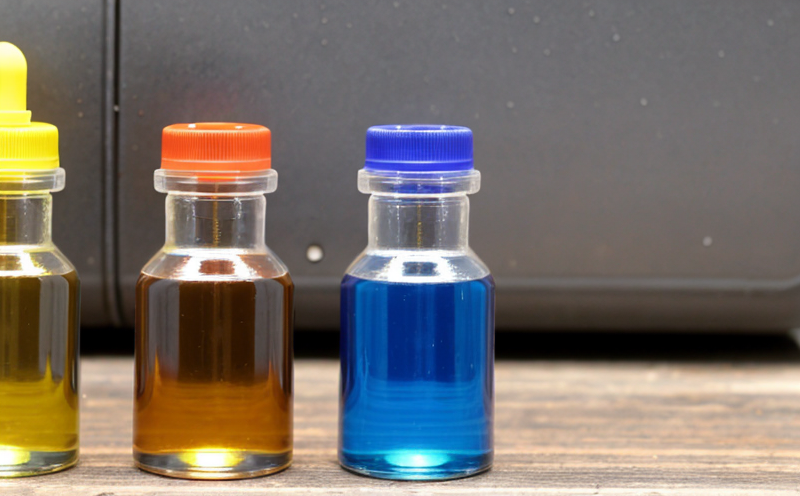Aviation Fuel Acid Number Testing
The aviation fuel industry relies heavily on stringent quality control measures to ensure safe and efficient aircraft operations. One crucial parameter in this regard is the Acid Number (AN) of aviation fuel, which quantifies its acidity levels. Elevated acid numbers can lead to corrosion within aircraft engines, thereby posing significant risks to flight safety.
The aviation industry operates under strict regulatory standards such as ISO 2067 and ASTM D975. These standards mandate the testing of fuel for its acid number to ensure it meets critical safety thresholds. The test involves a chemical reaction between the sample fuel and potassium hydroxide (KOH) in an ethanol solution, followed by titration until the endpoint is reached. This process measures the amount of KOH required to neutralize the acidity present.
The primary goal of this testing procedure is to identify potential issues early on in the production or handling stages, allowing for corrective actions before the fuel is used in aircraft engines. By adhering to these standards and conducting regular acid number tests, aviation fuel producers and suppliers can maintain high-quality standards that contribute significantly to flight safety.
During specimen preparation, it's essential to follow strict procedures to avoid contamination or alteration of the sample. This typically includes using clean, dry containers, ensuring proper mixing of the sample with ethanol, and allowing sufficient time for settling before taking a representative sample for testing. Proper calibration of the titration equipment is also critical in achieving accurate results.
The test apparatus used in aviation fuel acid number testing generally includes a burette, a pH meter, a stoppered conical flask, and an appropriate source of KOH solution. The process itself involves adding known volumes of KOH solution to the ethanol-ethanol blend sample until the endpoint is reached, which is determined by observing a change in color or pH reading.
The acceptance criteria for aviation fuel acid number testing are based on industry standards. According to ISO 2067 and ASTM D975, the acceptable limit for aviation fuel AN is typically between 0.2 and 0.3 mg KOH/g, depending on specific grade and application.
The importance of this testing cannot be overstated, as it directly impacts engine performance and longevity. By maintaining low acid numbers, fuel suppliers can extend the life of aircraft engines while minimizing operational disruptions due to corrosion-related issues. In addition to safety concerns, adhering to these standards also helps in meeting environmental regulations by reducing waste from corroded components.
Given the critical nature of this testing, it's essential for quality managers and compliance officers to understand the implications of deviations from the standard limits. Regular audits and training programs can help ensure that all personnel involved in fuel production and distribution are aware of the importance of these tests and how they contribute to overall safety.
Furthermore, R&D engineers play a vital role in refining testing methodologies and improving fuel formulations to achieve optimal acid number levels. Procurement professionals must also consider the reliability and consistency of suppliers who adhere to such stringent standards. By focusing on these aspects, the aviation industry can continue to operate safely and efficiently, contributing positively to global air travel.
Benefits
- Ensures compliance with international safety regulations (ISO 2067, ASTM D975).
- Promotes engine longevity and reliability by minimizing corrosion risks.
- Achieves regulatory compliance to meet environmental standards.
- Reduces the risk of operational disruptions due to fuel-related issues.
- Improves overall safety in aviation operations.
- Sustains high-quality standards across the supply chain.
Industry Applications
| Application | Description |
|---|---|
| Aircraft Engine Maintenance | Regularly testing fuel acidity helps in identifying potential corrosion risks early, ensuring timely maintenance. |
| New Fuel Formulations | Data from acid number tests are crucial for R&D teams to refine and improve fuel formulations. |
| Fuel Distribution Quality Control | Testing at various stages of distribution ensures that the fuel meets quality standards before it reaches end users. |
| Supplier Audits | Airline operators use test results to assess supplier reliability and adherence to quality standards. |
Quality and Reliability Assurance
The aviation fuel industry places a premium on the accuracy and consistency of testing procedures. To achieve this, laboratories must be equipped with state-of-the-art equipment and trained personnel capable of interpreting results accurately. The use of advanced titration techniques and pH meters ensures precise measurements that are essential for meeting the required standards.
Regular internal audits and external certifications are critical in maintaining these high standards. Internal audits help identify any discrepancies or deviations from standard procedures, allowing for corrective actions to be taken promptly. External certifications from recognized bodies ensure that laboratories adhere to international best practices and can provide reliable test results with confidence.
The reliability of the testing process is paramount. This involves not only the accuracy of individual tests but also the consistency across multiple samples and over time. By maintaining a robust quality management system, laboratories can ensure that every batch of fuel tested meets the required specifications. This trustworthiness is crucial in an industry where safety and compliance are non-negotiable.
In addition to these measures, continuous training for laboratory personnel ensures they stay updated on the latest testing techniques and methodologies. By investing in ongoing education, laboratories can enhance their capabilities and provide even more accurate and reliable test results. This commitment to excellence is a cornerstone of maintaining the aviation fuel industry's reputation for safety and reliability.





